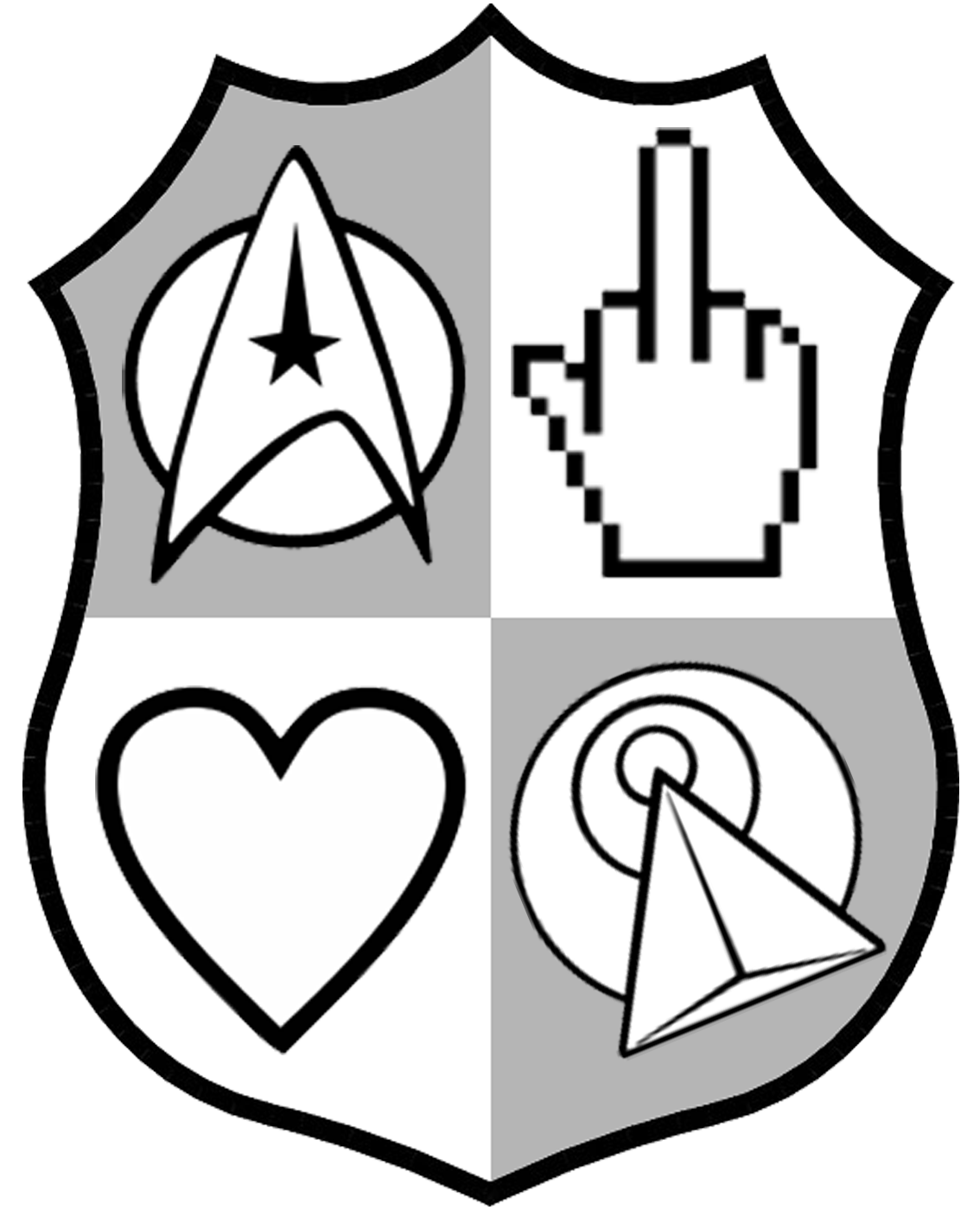Ari
July 13, 2016
Episode 39 – TOS 2×10: “Journey to Babel”
So this is probably my favourite episode so far, mostly because it’s FULL OF SPACE DIPLOMACY.
It’s also the first appearance of several Grand Trek Traditions, like Complaining about Dress Uniforms, and contains this scene, where Spock shows Bones how to do the Vulcan salute:
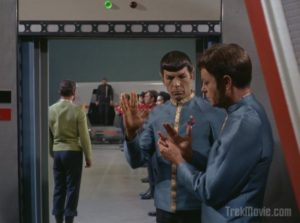
The Enterprise is ferrying a ship full of ambassadors to a summit on Codename Babel, where an important vote will take place: the admission of Dilithium-rich Coridan into the Federation. This is already a tense enough road trip – rife with sniping ambassadors and suspicions and accusations and ulterior motives – before the Enterprise swings by Vulcan to pick up their ambassador, Sarek, and his wife, Amanda… who happen to be Spock’s semi-estranged parents. That is: he’s kind of estranged from his dad but his mother mostly wants to know why he doesn’t visit more often. For Spock’s friends on the crew, this is literally the best thing that’s ever happened in space.
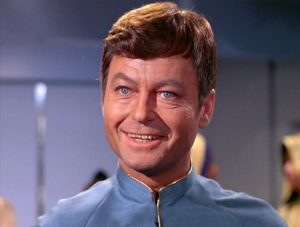
The episode from this moment on is split more or less evenly into two parts: the Vulcan family drama surrounding Spock and his father working out some of their differences, and the murder mystery that ensues when the Tellarite ambassador (who Sarek stops just short of flat-out accusing of being involved in illegal mining on Coridan) turns up dead, and Sarek is the main suspect. No prizes for guessing which part we enjoyed more.
Of course, this is a D.C. Fontana episode, so we’re already predisposed to love it. Tons of Vulcan-general and Spock-specific backstory, heaps of family-of-choice moments when Spock’s friends step in to stop him from doing something stupid he’ll regret forever, and several genuinely funny moments between Amanda and Kirk, who can’t believe he’s met another human being capable of out-sassing him and is obviously loving it.
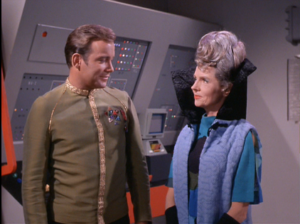
The heaping helping of Space Diplomacy, the window into the state of political affairs in the Federation, and a scene that seems to have been devised just to give Trek’s costume designers an excuse to showcase half a dozen new alien species, are just the cherry on top.
Podcast: Play in new window | Download | Embed
Subscribe: Apple Podcasts | Email | RSS
Ari
July 6, 2016
Episode 38 – TOS 2×09: “Metamorphosis”
Ah, Original Series: bastion of mystifying false dichotomies. Where you get Conspicuous Progressivism, you also get Astonishing Obliviousness Towards the Status Quo. For instance, this week’s episode contains both a scene where the Starfleet contingent of the cast are utterly nonplussed by the guest-star’s thinly-veiled-gay-panic-analog AND the message, shouted repeatedly through a narrative megaphone, that a woman’s life is meaningless without the love of a man.
That’s right, ladies: you’ve been wasting your lives.
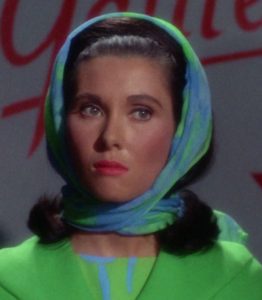
We open on a shuttle containing far too many members of the senior staff and one guest-star in the person of a Federation diplomat; she’s had to leave her Incredibly Important Negotiations to be rushed back to the Enterprise to receive medical treatment. But on the way, the shuttle Galileo (yes, that Galileo) is set upon by a malicious Glow Cloud and forced to land on Yet Another Shitty Planet, where they discover a man who claims to be Zefram Cochrane, who, uh, has officially been dead for over 150 years.
Now, if you’re passingly familiar with Trek canon, you might know that Zefram Cochrane is the dude who invented warp drive on Earth, a discovery that led directly to Earth’s First Contact with Vulcan and eventually, the formation of the United Federation of Planets. Kind of a big deal. Though the last time anybody saw him, he looked less like the square-jawed, corn-fed farmboy we meet in the episode and more like this:
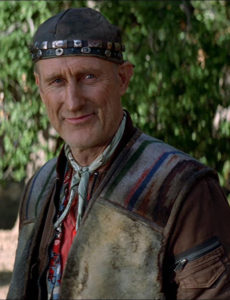
We quickly discover that Old Zefram Cochrane, who disappeared and was presumed dead in space at age 87, crash-landed on Shitty Planet and was rescued by the Glow Cloud, who restored him to a hale and hearty 35, supposedly because it (“she,” according to some deeply uncomfortable side-dialogue about the universality of the gender binary as a negligent excuse to give the Universal Translator a feminine voice, no I’m not still mad about that for like sixteen different reasons, why do you ask) loves him. Given that he set out into space with the intention of dying there, you’d think he’d be more pissed about the save, but… no.
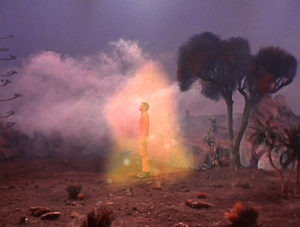
Candidly: the romantic love we’re told exists between Cochrane and the being he calls the Companion is pretty ham-handed and awkward and Heavy 1960s We-Have-No-Other-Vocab-For-This-Heteronormative, and we had a real problem with a lot of it. We also have a real problem with the way that poor, hyper-competent Assistant Commissioner Elinor Donahue, the episode’s putative female guest star, has barely any lines and virtually no agency, being present in the episode only to fall ill, hover on the ticking-clock brink of death, and then be forced into a body-sharing symbiosis with the Companion, which dooms whatever remains of Elinor to living out her life on Shitty Planet with a dude who swears he loves her/them/it even though he was having a xenophobic freakout over the idea roughly fifteen minutes ago but apparently has no problem with it now that she’s in the body of a conventionally-attractive human woman (who btw had literally no say in the matter).
This happens a lot in original Trek: mostly you can see the good intentions, but also a glaring lack of the the… vocabulary? discourse? sensitivity? to pull it off. Metamorphosis is another episode that, with a few tweaks here and there, could have been a genuinely interesting and touching treatise on the universality of love, but as it stood, mostly it just pissed us off.
The good news is – let’s end on a high note – is that this is, indeed, is a question that is explored repeatedly within the Trek Universe: What is love? Are some kinds of love more valid or precious than others? Just how different can two sentient beings be, before their differences make meaningful love impossible? For the most part, later Trek comes down with a firm and consistent answer that drives home one of the fundamental messages of Star Trek: that it is our similarities, and not our differences, that matter most.
Podcast: Play in new window | Download | Embed
Subscribe: Apple Podcasts | Email | RSS
Ari
June 22, 2016
A Brief Hiatus
As 2/3 of us are moving house in two days, there will be a brief hiatus while we get ourselves and our worldly possessions (including our recording equipment) from one place to the other. But have no fear, for we’ll be back in two weeks with discussion and review of the extraordinary crapshow that is Season 2, Episode 9: Metamorphosis.
In the meantime, please enjoy this pleasant and highly topical gif from Star Trek IV: The Voyage Home. The voyage to our new home will probably be much less enjoyable than the conclusion of this movie, but live in hope, right?

Ari
June 15, 2016
Episode 37 – TOS 2×08: “I, Mudd”
Since this is an episode where our fair ship stumbles, for the second time, across Harcourt Fenton Mudd, you might not expect a lot of substance. And sure enough, this is an episode where our crew finds (and by “finds” we of course mean “are hijacked there by a robot”) Harry Mudd set up on a planet of cheerfully servile robots… most of whom were constructed to his “personal specifications” and he is definitely sexing up on the regular.
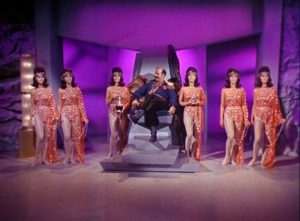
What you might not expect is that this is an episode written and aired during the golden age of artificial intelligence: a time when governments were pouring money into research, robots were in every sci-fi story that made it to the mainstream, and everyone in the know was sure we’d see the AI singularity by the 1980s.
That didn’t happen, of course (OR DID IT???), but the fact remains that this episode is chock-full of seriously fascinating nods to its era and the history of AI and robotics, both in sci-fi and in the real world. It’s a particular homage to all things Asimov, from the very title of the episode to Mudd’s many android co-stars’ faithful adherence to the Three Laws of Robotics, as well as the Zeroth Law.
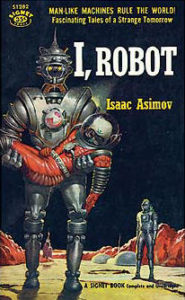
Not what you’d expect from an episode that might as well be subtitled Harry Mudd And The Planet of the Sexbots, but what the hell. Harry Mudd is still a contemptible trashbag of a human being, but if you’re at all interested in the way AI and robotics has been played out in popular culture, watch this one with an interested eye; I promise it’s worth it at least once.
Podcast: Play in new window | Download | Embed
Subscribe: Apple Podcasts | Email | RSS
Ari
June 8, 2016
Episode 36 – TOS 2×07: “Catspaw”
Just to give you an idea of our impressions for this week, most of our notes for this episode consist of repeated interrobangs and the word “WITCHES?!?!” underlined multiple times.
It’s best not to try and view this episode through much of a critical lens. There’s some vague Macbeth references. There’s a few places where mostly you want to hear the Nightmare Before Christmas intro song. There is a sexy cat lady who is also, at times, an actual cat (the first of at least two Sexy Cat guest stars in TOS, believe it or not). There is my only enduring childhood memory of this episode: the U.S.S. Enterprise encased in a block of clear plastic.
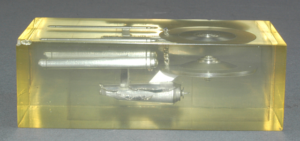
So that’s what’s there. So what’s not there? Is it a coherent explanation of who or what our villains are or what they’re after? DING DING DING CORRECT. We have no idea why two aliens who apparently invaded our dimension with (yet another) assistive machine that grants them nearly-invincible powers of illusion and impact do any of the things they do, least of all why they might kidnap a bunch of humans from a passing starship and imprison them in a castle straight out of some movie lot’s Scary Halloween Tour.
What we do know is that apparently their true forms look like this:
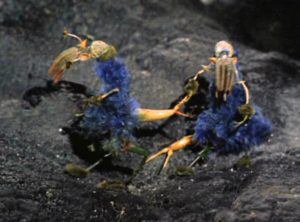
…yeah, we’re as confused as you are.
Podcast: Play in new window | Download | Embed
Subscribe: Apple Podcasts | Email | RSS
Ari
June 1, 2016
Episode 35 – TOS 2×06: “The Doomsday Machine”
This week’s episode is another in a long line of Almost A Very Good Episode. It opens on the Enterprise discovering yet another destroyed solar system that they swear was there only a year ago, and the missing U.S.S. Constellation, whose crew seems to have vanished into thin air.
Sounds great, right? Really, this story’s got all the makings of something we should love. There’s an unfeeling, impossible foe from beyond the edge of the galaxy; death and destruction on an almost incomprehensible scale; and a moving monologue on what it means to be Captain of a starship – both from Kirk and from the Captain of the drifting Constellation, whose crew was tragically destroyed along with the now-devoured third planet. The faceless foe from beyond the galaxy also looks just like a delicious cream horn.
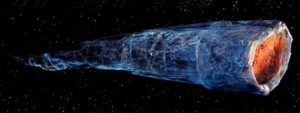
We enjoy the classic feel of the monster of the week: a wandering, automated planet-killer from so far away and so long ago we’ll likely never know what set it on its path. We like the thinkiness of the ultimate solution, and how while definitely gibberish it at least mostly makes sense: we do love when our crew manages to Science their way out of a problem. We’re fascinated by the period-brave (albeit brief) discussion of suicide (trigger warning, btw) and the way Decker slowly falls apart in the aftermath of his crew’s death.
There’s almost some very good strategy that goes into the eventual defeat of the Cream Horn, a mostly-neat bit of to-ing and fro-ing between the two damaged ships and a shuttlecraft (which ultimately succumbs to Countdown Fatigue when the last fateful beam-out is interrupted by cheerful little flashbangs and Scotty cursing in a Jefferies Tube leading to us all shaking our fists and yelling “oh, come on at the screen).
It’s just that we hate Decker, so, so much.
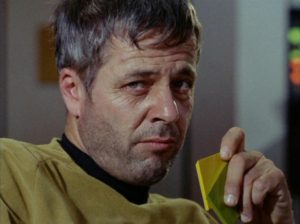
We’re supposed to feel sorry for this guy, and at first, we do. He’s lost his crew because he did the right thing: he got them off a failing ship and stayed behind. “That’s what the Captain’s supposed to do, isn’t it?” he asks Kirk, in the episode’s most genuinely gutting moment. There’s a brief throwaway line before and after that Decker and Kirk were once friends, but it seems everyone forgets about that immediately, because from that moment on, Decker is in a revenge-driven down-spiral that starts with him taking control of the Enterprise when Kirk ends up stranded aboard the damaged Constellation, is followed by his risking Kirk’s ship and crew in a series of idiotic, abortive suicide runs, and culminates in a space-homage to Captain Ahab, with Decker taking a shuttlecraft right into the mouth of the monster and blowing himself to kingdom come.
We can’t speak for the Enterprise crew, but at least by the NSMTNZ crew, he will not be missed.
Podcast: Play in new window | Download | Embed
Subscribe: Apple Podcasts | Email | RSS
Ari
May 25, 2016
Episode 34 – TOS 2×05: “The Apple”
This week’s episode… I’m gonna be honest with you: it asks no coherent questions, provides no lucid answers, but does involve a massive, probably-malevolent snake-computer. So… there’s that.
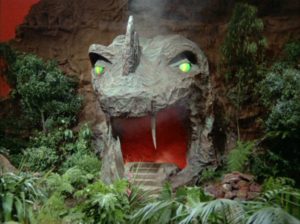
There’s a lot of Garden of Eden metaphors sprinkled vaguely throughout this story, though the operative word here is “vague.” Our brave (and frankly kind of stupid) away team beams down to a planet that they liken to paradise: constant, hospitable temperatures from pole to pole, fertile soil “ripe for husbandry” (and the awkward sex references just keep on coming), beautiful flowers that will murder you as soon as look at you (and will happily do both), exploding rocks, and a small but thriving population of spray-tanned slaves/worshipers who would look more at home in Willy Wonka’s Chocolate Factory than the stereotypical grass-hut village they’ve been placed in for… whatever reason. It’s unclear. To feed Vaal? Vaal apparently really likes space melons.
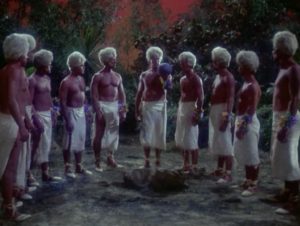
If you couldn’t tell, the consensus was that this was a pretty bad episode. On the face of things, it seems like the kind of episode that at least two of us should enjoy: evil computers! Wacky hijinks in an alien wilderness! Enterprise-threatening peril on a countdown clock! But it all comes apart before it even begins, largely because nobody involved in the writing of this episode could decide what metaphor they wanted to explore.
And unlike previous similar stories where the heroic Enterprise crew comes in and rescues a “primitive”/enslaved/oppressed population from evil computers/”barbaric” cultural practices/themselves, in this case the child-like Feeders of Vaal are left, at the end of the episode with basically a “good luck, see you never!”
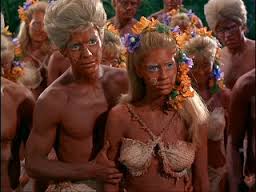
We spend a lot of episodes just trying to figure out what painfully-transparent moral we’re supposed to be left with at the end, and while the Eden imagery was coming on strong, we’re only like 45% that the metaphor fits. We can agree on one thing, though: perfect innocence is overrated, and nobody really wants to live in a garden forever.
Podcast: Play in new window | Download | Embed
Subscribe: Apple Podcasts | Email | RSS
Ari
May 18, 2016
Episode 33 – TOS 2×04: “Mirror, Mirror”
Are you excited? You should be! This week, we embark on one of the Trek universe’s most beloved continuing storylines: The Mirrorverse!
The Mirrorverse. Where real men wear sparkly gold sashes, real women have intimidating She-Ra abs and murderbiceps, and literally anyone of any gender (non-binary murder-bling not pictured) will knife you for a donut.
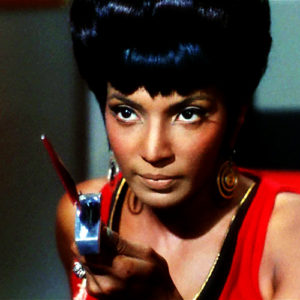
The Mirrorverse has multiple episodes across every Trek series, and the premise is simple: something important in the past went juuuuust differently enough that the Federation never happened. Instead, at least as far as TOS goes, we instead got the Terran Empire, a culture in which humans aren’t the squishy, peace-loving socialists of the prime universe, but something decidedly more Klingon-like, and explicitly the bad guys.
Kirk, Uhura, Scotty and Bones end up there via a transporter accident (originally by switching bodies with their doubles, but later on the alternate-universe travel to the Mirrorverse is just straight-up travel via transporter) and have to act like their bad-guy doppelgangers to buy time to get home. Back in the real world, Spock is not fooled by dark!Kirk, Uhura, Scotty and Bones for a second; they spend the episode locked in the brig, because Spock is a highly competent officer.
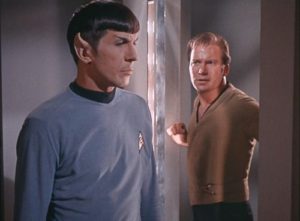
Later on in the Trek timeline, the Mirrorverse changes drastically as a direct result of Kirk & Co’s visit – he sows a seed of doubt in Spock about the long-term viability of the Empire, and Spock ends up overthrowing and reforming the Empire to something more peaceful and progressive… which is promptly overthrown by external forces. Whoops.
We all three loved this episode, from Imperial Starfleet’s hilarious murderbling to Uhura’s incredible battle-crop-top and washboard murderabs (and literally everything Nichelle Nichols does in this episode, who are we kidding) to dark!Spock’s famous evil goatee. I could list more, but we’d be here all day. The Mirrorverse: the gift that keeps on giving.
Podcast: Play in new window | Download | Embed
Subscribe: Apple Podcasts | Email | RSS
Ari
May 11, 2016
Episode 32 – TOS 2×03: “The Changeling”
So if the plot of this week’s episode feels familiar, that’s because it formed the basis of the first Star Trek movie, Star Trek: The Motion Picture: the Enterprise encounters an ancient, Earth-built space probe that promptly tries to kill them.
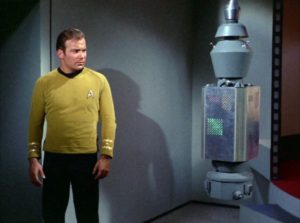
It’s a theme often-repeated in later Trek. A probe, originally sent out by ancient Earth scientists (ancient to the Enterprise, but pretty-far-future to the writers of the ep), designed to do scientific research, is believed lost or destroyed. But surprise! The probe – in this story, called Nomad – is intact, and on its way home to Earth, but has been altered by accident or by the design of a more advanced civilization, its original, benign purpose warped into something destructive and dangerous. Nomad‘s new mission, by the time it encounters the Enterprise, is to destroy all biological “infestations.” You know… like the human race.
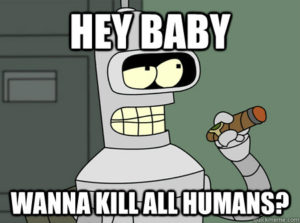
Prior to encountering the Enterprise, Nomad has wiped out at least 4 planets’ worth of people, and post-encounter, it kills off at least four redshirted security officers (minus sensible engineer Mr. Singh, who survives mainly due to rational fear), plus temporarily murdering Scotty (and then rebooting him, nbd) and mind-wiping Uhura (also apparently nbd, despite the extremely problematic nature of the only woman of colour in this episode being the character to temporarily turn into a vegetable??). Despite a cold open with a body count higher than a Garth Nix novel, and Nomad’s stated intention of wiping out the population of the planet Earth, the stakes do not feel particularly high, at least not judging by the attitudes of the command staff.
There’s also a mostly-buried metaphor about the probe as a faerie changeling – see the title – which casts Nomad as the human child stolen by the faeries and replaced by an impostor. We started out pretty skeptical about this mostly-pretty-shaky premise, but mostly talked ourselves around to it pretty early on. Human beings have an intense emotional connection to the little bots and other machines we send out into the darkness to explore places we can’t go – watch any video of the reaction to the Philae touchdown, or follow the Curiosity rover’s Twitter account – perhaps because they can go places we can’t. So for one of them to return changed beyond all recognition, or to return with a dark purpose, is genuinely distressing (at least, to us).
Let’s hope that if any real space probes ever return home (presently unlikely – real space probes are sent out with no intention of recall), they’re pleased to see us, the descendants of those who sent them out into the universe.
***
We apparently skipped over the counts part of the episode for this one, so here they are: Deaths: approximately four billion (that we know of); eight ladies, 6 POC.
Podcast: Play in new window | Download | Embed
Subscribe: Apple Podcasts | Email | RSS
Ari
May 4, 2016
Episode 31 – TOS 2×02: “Who Mourns for Adonais?”
This week’s special guest-host, Trisha, summed up the episode pretty nicely: “hand jobs and sexism.”
In this episode, our brave crew finds themselves on a planet with a seemingly all-powerful being to claims to be one of the ancient Greek gods. The relationship does not begin in a way we can define as “smooth;” namely, said god reaches out a giant green space-hand to grab the ship, and then introduces himself by means of projecting his giant head into space to start delivering orders.
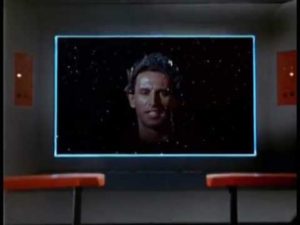
What follows is a genuine shitshow of carelessly sexist nonsense in which our sole lady guest star falls so head-over-heels inexplicably in love with said ancient short-skirted deity that his command that the Enterprise crew abandon ship and become simple sheep herders and him-worshipers seems like, y’know, no big deal.
To be fair, there are some interesting beats in this episode: the Ray Harryhausen-esque effects; a number of semi-interesting mythology-as-sci-fi nods that feel very like they may have informed the basis of the Stargate franchise, and of course, let’s not forget the frankly amazing costumes worn by guest stars Michael Forest and Leslie Parrish (miracles of fashion and engineering).
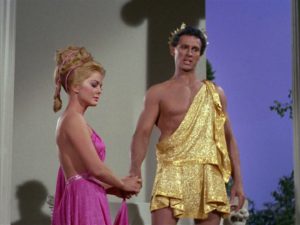
We talked a lot more about the definition of a god than you might expect for an episode we all so roundly disliked, but for the most part the takeaway was outrage at the idea that some alien with some fancy tricks might set himself up as lord and commander of our destinies; we’re intelligent, sentient beings with a spaceship, damn it. As it happens, James Kirk agrees with us, as his face throughout most of the episode is this one:
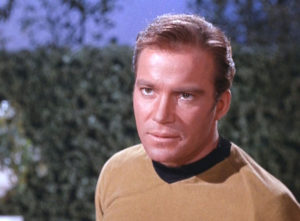
Podcast: Play in new window | Download | Embed
Subscribe: Apple Podcasts | Email | RSS
